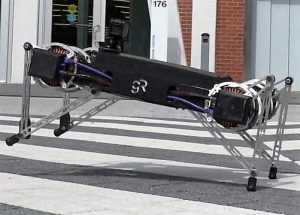When:
June 28, 2017 @ 12:00 pm – 1:00 pm
2017-06-28T12:00:00-04:00
2017-06-28T13:00:00-04:00
Where:
B17 Hackerman Hall

Abstract
The first dynamic legged robots (developed by Raibert) were controlled using a “three-part” hopping strategy, synthesized by developing controllers in isolation (e.g. vertical hopping controller ignores fore-aft motion). Dynamical systems theory can offer a formal representation of such reductions in terms of attracting invariant submanifolds with restriction dynamics conjugate to a template system, which itself may be a composition of several dynamical primitives. Such notions of reduction have appeared before in the literature (in the form of “anchored templates”, “zero dynamics”, “dynamic motion primitives”, “locomotor subfunctions”), and also in running animals across several orders of magnitude of scale. However, formal synthetic embedding (“anchoring”) of these requires cancellation of coupling terms appearing in the natural dynamics, which requires abundant actuation, sensing fidelity, and parametric certainty.
We introduce a new notion of approximate “averaged” anchoring which allows compositions of simple decoupled controllers (such as Raibert’s) to successfully embody dynamic running and hopping on a quadruped and tailed biped with few parameters and a great deal of empirical robustness. We then describe our new advances: a new analytical tool for formal verification of these compositions (hybrid averaging), which reveals for the first time (a) connections between morphology and composition, and (b) how within-stance time-reversal symmetry helps mitigate coupling interactions. We end with work-in-progress on compositions of feedback-stabilized attractors as robust reference generators for walking without any feedforward components.
Bio
Avik De is a PhD candidate at the GRASP laboratory in the University of Pennsylvania advised by Dr Daniel Koditschek. He graduated with a BS/MS in Mechanical Engineering from Johns Hopkins University in 2010, during which he performed an empirical study on how/when human beings inject feedback to stabilize a 1-dimensional paddle juggling task. Bio-inspiration remains a key research interest, and during his PhD, he switched his efforts into modular/compositional control of dynamic locomotion, as well as the design of dynamic locomotor systems. He co-founded “Ghost Robotics” in 2016, commercializing research that led to the creation of a family of power-dense direct-drive legged robots with high actuation bandwidth and proprioceptive sensing capabilities. He has in part created curriculum for two online courses: “Robotics: Mobility”, and “Robotics: Capstone” on coursera.



